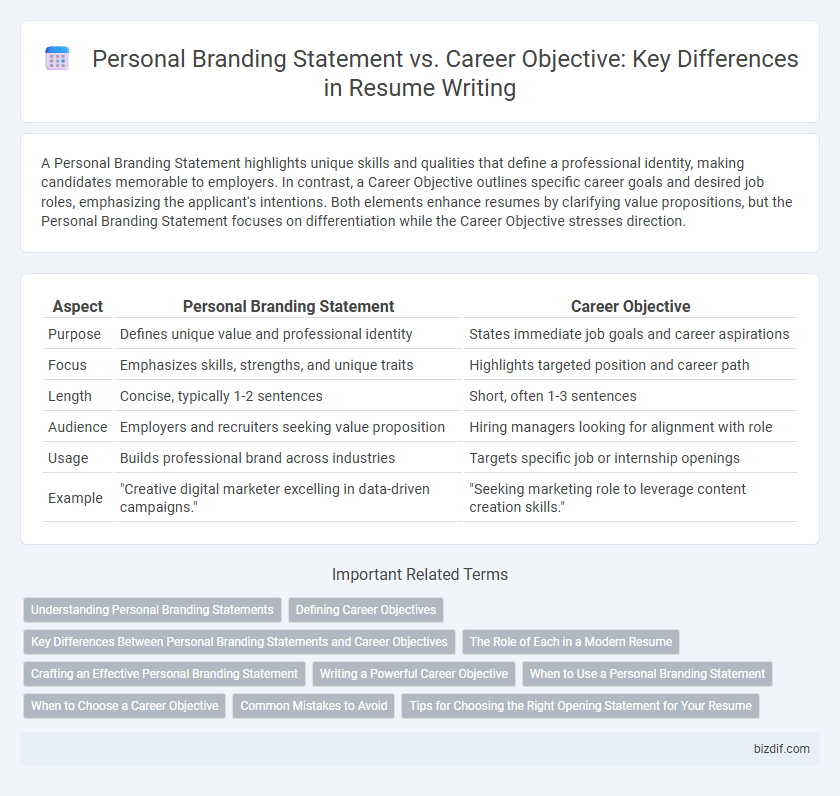A Personal Branding Statement highlights unique skills and qualities that define a professional identity, making candidates memorable to employers. In contrast, a Career Objective outlines specific career goals and desired job roles, emphasizing the applicant's intentions. Both elements enhance resumes by clarifying value propositions, but the Personal Branding Statement focuses on differentiation while the Career Objective stresses direction.
Table of Comparison
| Aspect | Personal Branding Statement | Career Objective |
|---|---|---|
| Purpose | Defines unique value and professional identity | States immediate job goals and career aspirations |
| Focus | Emphasizes skills, strengths, and unique traits | Highlights targeted position and career path |
| Length | Concise, typically 1-2 sentences | Short, often 1-3 sentences |
| Audience | Employers and recruiters seeking value proposition | Hiring managers looking for alignment with role |
| Usage | Builds professional brand across industries | Targets specific job or internship openings |
| Example | "Creative digital marketer excelling in data-driven campaigns." | "Seeking marketing role to leverage content creation skills." |
Understanding Personal Branding Statements
A Personal Branding Statement clearly defines your unique value and professional identity, setting you apart from other candidates in the job market. Unlike a Career Objective, which focuses on your career goals, a Personal Branding Statement highlights your core strengths, skills, and what you bring to potential employers. Crafting a concise and impactful Personal Branding Statement enhances your resume by showcasing your distinct expertise and aligning your personal brand with the job you seek.
Defining Career Objectives
Defining career objectives in a resume involves clearly articulating specific professional goals that align with the desired job role and industry, helping employers quickly understand the candidate's direction and aspirations. A career objective emphasizes measurable outcomes and skill development, aiding in targeted job searches and effective career planning. Unlike personal branding statements, which highlight unique value propositions and personal attributes, career objectives focus on setting clear, achievable career milestones.
Key Differences Between Personal Branding Statements and Career Objectives
Personal branding statements emphasize unique skills, values, and professional identity to create a memorable impression, whereas career objectives focus on specific job goals and aspirations within a role or industry. Personal branding statements are concise and crafted to showcase individuality, making them ideal for differentiating candidates in competitive markets. Career objectives typically highlight the candidate's career path intentions and how they align with the employer's needs.
The Role of Each in a Modern Resume
A Personal Branding Statement highlights unique skills and professional identity to differentiate candidates in competitive job markets, emphasizing value and expertise. A Career Objective focuses on specific job goals and aligns candidate aspirations with employer needs, providing clear direction for recruiters. Together, these elements shape a modern resume by balancing individual strengths with targeted career intentions.
Crafting an Effective Personal Branding Statement
Crafting an effective personal branding statement requires clarity, uniqueness, and relevance to your professional goals, highlighting your core strengths and value proposition. Unlike a career objective that focuses on job aspirations, the personal branding statement communicates your distinct professional identity and what sets you apart in the industry. Incorporating keywords aligned with your skills and target role enhances visibility and impact in resume optimization.
Writing a Powerful Career Objective
Writing a powerful career objective involves clearly articulating your professional goals and the value you bring to potential employers, tailored specifically to the job you are applying for. A well-crafted career objective highlights key skills, industry experience, and career aspirations, making it more targeted and impactful than a general personal branding statement. Emphasizing measurable achievements and aligning objectives with company goals significantly enhances the effectiveness of a resume.
When to Use a Personal Branding Statement
A Personal Branding Statement is most effective when you aim to highlight your unique value proposition and establish a memorable professional identity, especially in competitive job markets or creative industries. Use it when applying for roles where differentiation and individuality can directly impact hiring decisions, such as marketing, design, or entrepreneurship. This statement works well for professionals seeking to showcase their expertise and personal attributes concisely, helping recruiters quickly understand what sets them apart.
When to Choose a Career Objective
Choose a career objective on a resume when seeking entry-level positions or making a significant career change, as it clearly communicates specific goals and intentions to potential employers. This concise statement highlights your immediate professional objectives and aligns your skills with the job requirements. Career objectives are ideal for demonstrating focus and direction when experience is limited or the career path is evolving.
Common Mistakes to Avoid
Confusing a personal branding statement with a career objective often leads to generic, unfocused resume summaries that fail to showcase unique value or professional identity. Avoid common mistakes such as using vague language, prioritizing employer goals over personal strengths, or neglecting specific achievements that highlight skills and impact. Crafting a concise, authentic personal branding statement that aligns with career aspirations enhances clarity and attracts recruiters more effectively.
Tips for Choosing the Right Opening Statement for Your Resume
A personal branding statement highlights your unique value and expertise, making it ideal for professionals with established skills or niche specialties, while a career objective focuses on your goals and aspirations, better suited for entry-level candidates or those changing careers. Choose the opening statement that aligns with your career stage and target role to create a compelling introduction that resonates with recruiters and hiring managers. Tailoring your statement with specific keywords from the job description enhances visibility in applicant tracking systems and strengthens your overall resume impact.
Personal Branding Statement vs Career Objective Infographic

 bizdif.com
bizdif.com